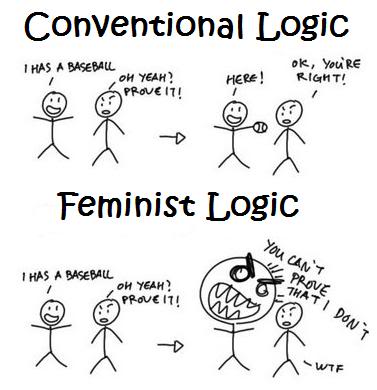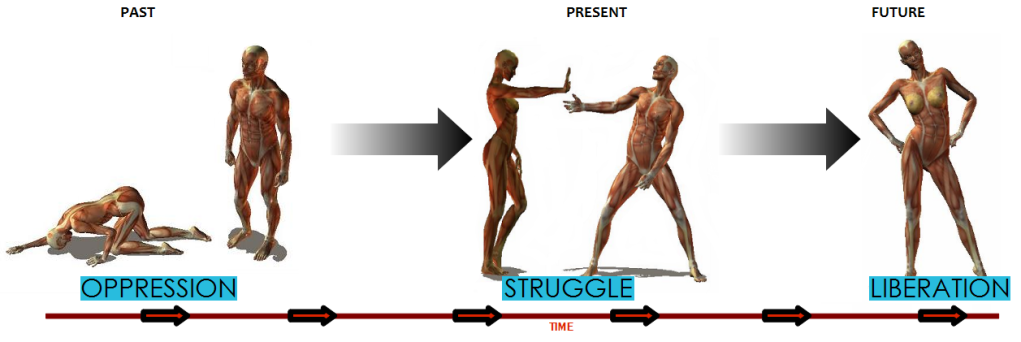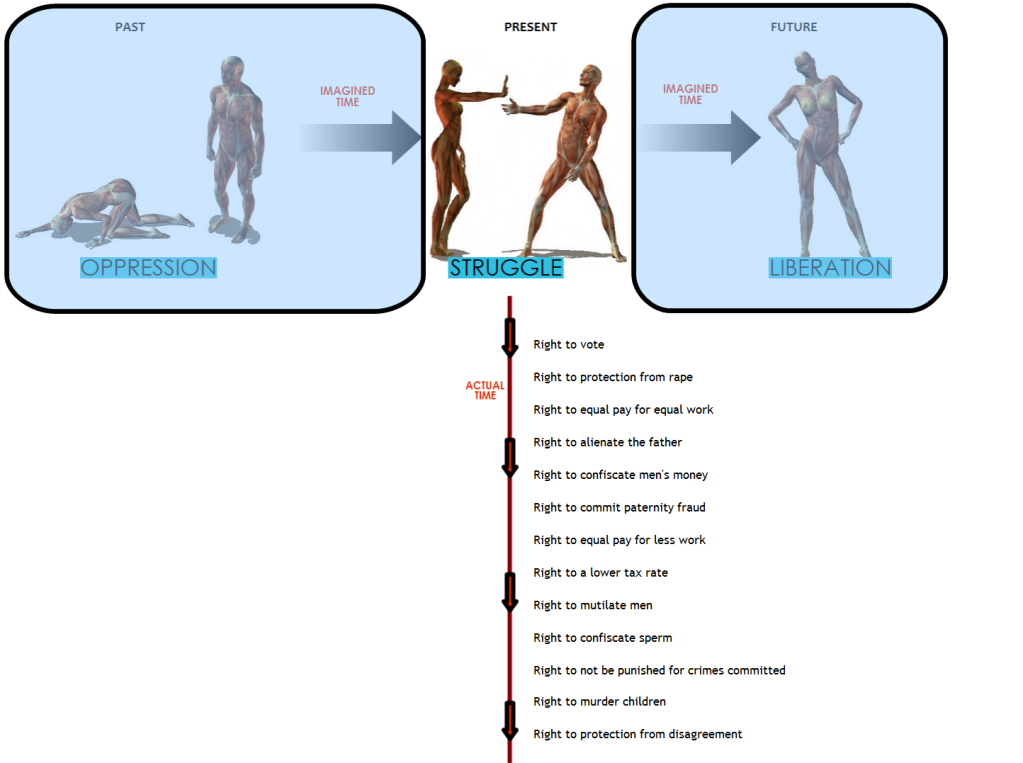Teoría del Ginocentrismo
Las conferencias seminales que se encuentran a continuación fueron pronunciadas en 2011 por Adam Kostakis:

1. Mirando hacia afuera desde el abismo
Conferencia Nº 1
“Me encanta una oposición que tenga convicciones” –Federico el Grande
La Batalla de los Sexos ha degenerado en una Guerra Sucia, y nosotros, cada uno de nosotros, estamos siendo reclutados en ella por fuerzas a las que no les importa ni una pizca la igualdad o la ecuanimidad.
La Propaganda, como una herramienta de control, sólo es efectiva en tanto que la visión del mundo que presenta concuerde con la percepción del mundo que el público que se desea capturar con esa propaganda experimente en el día a día. Entre más amplio es el vacío entre el mundo que se percibe y la representación propagandística del mundo, menos efectiva –y por lo tanto menos útil– se vuelve eventualmente la propaganda. Hemos alcanzado un punto crítico en el que las mujeres están rechazando cada vez más el feminismo por considerarlo irrelevante o inaplicable a sus vidas, pues el mundo que describe la ortodoxia feminista no parece existir en el planeta Tierra. Al mismo tiempo, nos estamos acercando al zénit del control feminista sobre el mundo habitado, que combina la represión estatal con el tribalismo de género, y ambas fuerzas se intensifican exponencialmente mientras se usan mutuamente como palanca para seguir y seguir subiendo.
Esto me recuerda un antiguo acertijo que hace la pregunta, ‘¿qué tan alto se puede escalar una montaña?’ La respuesta es ‘hasta la cima,’ porque una vez que se alcanza la cúspide, el único camino posible es hacia abajo. El Feminismo ya no tiene ningún obstáculo; el control total está al alcance de la mano, y por total, me refiero a que será totalitarista. La carta de víctima ha servido como un pase de entrada por la puerta de atrás del estado y las instituciones supranacionales. Ahora que tienen poder sobre los hombres, las feministas han restablecido los principios del Manifiesto Scum de Valerie Solanas, declarando –con un lenguaje que evoca claramente la Solución Final– que pronto seremos testigos de El Fin de los Hombres. La ‘guerra de los sexos’ no se está enfriando en tanto las mujeres se acercan a (o en algunos casos, sobrepasan) la igualdad con los hombres –se está calentando. Las feministas no sólo están incitando el odio hacia los hombres públicamente y se están saliendo con la suya; están usando sus puestos en el gobierno, en la academia, en comités de expertos y en los medios para hacer realidad sus violentas fantasías, abogando por la renuncia de los derechos humanos básicos de los hombres.
Para tomar un ejemplo reciente, la Secretaria de Estado de la nación más poderosa del mundo declaró hace poco que una unidad internacional móvil de persecución será establecida para apuntarle, específicamente, a hombres alrededor del mundo. O para tomar otro ejemplo reciente, una destacada feminista ha sugerido que ciertos principios legales diseñados para proteger ciudadanos inocentes de persecución o encarcelamiento injustos, que datan de la firma de la Carta Magna, deberían retirárselos a los hombres. Los hombres son sujetos al régimen arbitrario de las mujeres en la India, enfrentándose a severas penalidades por haber causado la más mínima ofensa, aun involuntariamente.
Nada de esto cuadra con el cliché de las ‘mujeres como víctimas’, el cual ha sido muy útil para que las feministas llegaran a este punto. No obstante, el feminismo está firmemente afianzado y en control de los mecanismos que ostentan el monopolio del poder físico, ya sea legítimo o no. Difícilmente queda alguna fuerza que haga algún contrapeso. Occidente ha encontrado su nueva Misión imperial para reemplazar al Cristianismo Global: el culto forzado a las mujeres. Y mientras cualquier voz disidente es inmediata y violentamente silenciada, las feministas son libres de radicalizar su agenda anti-masculina hasta el punto de náusea moral, y de desencadenar sobre el mundo todo tipo de atrocidades vengativas.
Pues ya ven ustedes, cuando la propaganda deja de ser una herramienta efectiva de control, quien quiera controlar simplemente encontrará otras formas de hacerlo. El control del estado –el monopolio de la fuerza física– es el medio que las feministas han buscado. Pero a diferencia de la propaganda, que manipula la mente, el control estatal sólo brutaliza el cuerpo. El poder de quien controla siempre yace eventualmente sobre la resistencia de los controlados, y por lo tanto el consentimiento debe ser fabricado. El Imperio Romano no duró quinientos años ejerciendo la fuerza bruta, sino con el apoyo masivo; el Emperador era glorificado como una deidad mortal, e incluso en las aldeas más pequeñas de su reino se erigían voluntariamente estatuas y altares en su honor. Por demasiado tiempo han estado los hombres prosternados ante el altar de las mujeres, y es tentador creer que esta sumisión psicológica no cederá incluso ante la opresión física o la exterminación –que los hombres marcharán hacia su muerte como corderos expiatorios, esperando ganarse el favor de las mujeres con sus últimas acciones serviles. Pero las proclamaciones que hacen referencia al Fin de los Hombres pueden resultar tan vacías como aquellas que se hicieron hace casi veinte años con respecto al Fin de la Historia. El así-llamado Choque de Civilizaciones que siguió llevó a su autor a refutar su propia posición. Deberíamos ser optimistas con respecto a que un verdadero Choque de los Sexos terminará pronto con las feministas humilladas y admitiendo su derrota.
En tanto el feminismo crece más y más poderoso, y comienza a darse cuenta de sus ambiciones radicales, simultáneamente extenuará su capacidad para fabricar consentimiento. Aquellas ilusiones caballerescas que aseguran el consentimiento de los hombres, y sobre las que en últimas yace el feminismo –‘las mujeres como víctimas’, y otras– serán más difíciles de mantener con el tiempo. Entre más fuerza sea utilizada contra los hombres para someter e inhibir sus vidas, más descontento empezará a cultivarse entre ellos. La burbuja de la misandria debe estallar en cualquier momento, y con cada ejemplo de exageración, que pone a hombres inocentes en el papel de criminales y sometidos a castigos humillantes y despiadados, una nueva grieta aparece en el muro, otro paso hacia el día en el que toda esa odiosa edificación colapse bajo su propio peso –y, crucialmente, bajo el nuestro.
Nuestra tarea es, entonces, doble: primero, abrir el camino para apresurar el colapso del feminismo.
Segundo (y complementario al primero): diseñar las armas ideológicas para ayudar a prevenir un resurgimiento feminista después de que éste colapse.
Ambas metas requieren, no fuerza, sino su propia propaganda. Siendo como son las cosas, esto no requiere que distorsionemos la verdad. Por el contrario, debemos, en la mayor parte, exponer aquellas verdades que otros han distorsionado; revelando los hechos a una audiencia más amplia que aún no los ha recibido, de manera diligente y sin remordimientos. Como un notable activista en el campo lo puso recientemente, no se necesita atacar feministas –todo lo que se tiene que hacer es citarlas. Simplemente, el exponer el odio feminista a la luz desinfectante del mundo podría ser suficiente para cambiar la marea –razón por la cual enormes cantidades de energía se utilizan para informar mal, descreditar, neutralizar y obscurecer a los argumentos y defensores de la oposición.
Una estrategia clave para el logro de nuestra tarea fue anunciada en una conferencia en Abril de 2010 en la forma de Estudios Masculinos, una nueva disciplina que ya está enfrentando la hostilidad del mundo académico que desde hace mucho tiempo ha sido un bastión del feminismo radical. Que este dedo en la llaga, esta espina en el costado de la uniformidad académica pueda provocar semejante indignación como lo ha hecho no debería ser una sorpresa. He aquí una selección de los temas que el programa de Estudios Masculinos de propone abarcar:
Los factores socioeconómicos que llevan a la predominancia masculina en el sistema de justicia criminal, subempleo y oportunidades limitadas como padres, que resultan de los cambios en la ley de custodia infantil (economía, medicina forense, derecho, política pública);
Representaciones misándricas de niños y hombres adultos en los medios y en la publicidad (estudios de medios incluyendo cine, televisión e internet, y publicidad);
Testimonios de la experiencia de ser hombre (historia, literatura, autobiografía);
Asuntos urgentes relacionados con el bienestar emocional de niños y adultos mayores, notablemente la depresión y el suicidio (psicología clínica, medicina y psiquiatría, trabajo social).
Friedrich Nietzsche, en el siglo XIX, advirtió que si uno mira dentro del abismo demasiado tiempo, uno se dará cuenta que el abismo devuelve la mirada. Debe ser profundamente alarmante para las feministas despertar una mañana y encontrar que otra gente las está deconstruyendo a ellas, que se ha puesto como misión en la vida exponer y corregir las ofensas feministas.
Esta parece ser la respuesta de la respuesta abusiva del sector feminista a la idea de que los hombres discutan ideas de sexo y sexismo sin la supervisión de las mujeres. No importa lo que las feministas piensen sobre los Estudios Masculinos, porque las feministas no son el público que esta disciplina pretende captar; su éxito no depende de la aprobación feminista, un hecho con el que les será difícil reconciliarse. En cualquier caso, aún si lanzaran una campaña organizada para impedir que los hombres discutan sus experiencias a través del foro de la academia, las feministas son incapaces de evitar que esto suceda en alguna parte. El verdadero escollo hoy en día para las dictadoras en potencia es que vivimos en una Era de la Información. Es difícil controlar el flujo de información cuando la época misma en la que vivimos está definida por ello. Entonces, tengamos estas discusiones ahora mismo –mientras la gente pueda utilizar Internet para congregarse y decir lo que piensa, nada puede detenernos. Tengamos estas discusiones en un millón de lugares, en el mundo real –porque si lo hombres no hubieran hablado de sus experiencias, como hombres, entonces no estaríamos anhelando el comienzo de los Estudios Masculinos en el futuro cercano.
Ya hay un gran número de sitios de internet dedicados a asuntos relacionados con los Derechos de los Hombres; ciertamente, éstos parecen haber proliferado en los últimos años, ¡brotando en todas partes como deliciosos hongos! Para la mayoría de estos blogs, su contenido no necesita un tema unificador más grande que la oposición al feminismo. Dada la activa y creciente red de gente interesada en el estatus de los hombres actualmente, ha sido posible ampliar los límites un poco más allá. Este blog tiene como objetivo alentar la cristalización intelectual de lo que llamamos el Movimiento por los Derechos de los Hombres, al llevar a cabo un análisis atento en un amplio espectro de temas. Este sitio web está dedicado a la elucidación de la Teoría del Ginocentrismo.
¿Qué es la Teoría del Ginocentrismo? Para ponerlo de manera sencilla, es un sistema que explica las relaciones sociales entre los sexos. Reemplaza a la Teoría del Patriarcado, la piedra angular del pensamiento feminista. Ahora memética, la Teoría del Patriarcado ha demostrado ser una herramienta excelente para negarles a los hombres sus derechos, incluyendo sus derechos más básicos a la dignidad y a la integridad corporal, con la pretensión de que todos los hombres son opresores (o al menos, aliados con hombres opresivos de quienes obtienen beneficios) y que todas las mujeres son víctimas del poder masculino. La Teoría del Ginocentrismo es la articulación de muchos años de esfuerzo por parte de varios pensadores en el ámbito de los Derechos de los Hombres para describir una visión de mundo que refleje de una manera mucho más precisa las experiencias de los hombres –y de muchas mujeres también. En contraste con el tribalismo simplista y que no acepta matices de la Teoría del Patriarcado, la Teoría del Ginocentrismo no equipara la realización masculina con la celebración del poder tiránico sobre las mujeres. La Teoría del Ginocentrismo no acepta que los hombres actúen en bloque de poder. Por el contrario, la Teoría del Ginocentrismo expone la divergencia entre estadísticas demográficas e intereses; fundamentalmente, que mientras un pequeño número de hombres pueden ser los que tienen el poder social y político, esto no quiere decir en lo absoluto que lo hacen para el beneficio de todos los hombres; y que de hecho, más a menudo, lo hacen para el beneficio de la mayoría de las mujeres y en detrimento de la mayoría de los hombres. La Teoría del Ginocentrismo defiende la idea de que el poder sea entendido como multifacético, y que esa norma históricamente ha sido una cuestión de atraer, y proteger, a las mujeres.
Lo anterior, sin duda, confundirá a aquellos que asumen que el poder en todos los niveles puede ser identificado de acuerdo a la forma de los genitales de aquellos que toman las decisiones importantes –independientemente de lo que decidan.
Cualquier otra cosa está más allá del alcance de esta conferencia introductoria. Y así, continuaremos con este hilo de ideas la próxima semana. Las conferencias se ofrecen los sábados, y estudiantes de todas partes del mundo están invitados a asistir –o a ponerse al día en su propio tiempo si así lo desean. Habrá discusiones inmediatamente después de las conferencias. A diferencia de la mayoría de los blogs feministas, cuyas autoras se asemejan a su mentora Mary Daly en negarles sistemáticamente a los hombres su derecho a hablar, todo el mundo será bienvenido para hablar aquí, aunque se justificarán expulsiones en caso de que alguien publique material obsceno o información personal. Prefiero que las feministas sean requisadas a que se les niegue la entrada, pero el destino de aquellos trolls que sean verdaderamente persistentes estará a mi discreción.
Les deseo a todos un día de reflexión, y los veré pronto.
Antes de lo que piensan.
Adam Kostakis
* * *
2. La Misma Vieja Historia Ginocéntrica
Conferencia Nº 2
Mis lectores deben entender que las preocupaciones que aborda la Teoría Ginocéntrica no se limitan al feminismo. El feminismo aún es relativamente nuevo en la escena, mientras que el Ginocentrismo ha estado presente desde que se tiene registro. El Movimiento de los Derechos de los Hombres busca abordar problemas asociados con el feminismo, pero no limita su atención a estos problemas. Muchos de ellos empezaron antes de la emergencia del feminismo como tal en los últimos años del siglo XIX, aunque se hayan expandido y exacerbado desde entonces. El feminismo no es más que el empaque moderno del Ginocentrismo, un producto antiguo, que ha sido posible en su forma presente gracias a las extensas políticas de asistencia social en el periodo de la posguerra.
A pesar de su retórica radical, el contenido del feminismo o, se podría decir, su esencia, es extraordinariamente tradicional; tan tradicional de hecho, que sus ideas claves se toman por sentado, como dogmas indiscutidos e incuestionables, que disfrutan del consentimiento uniforme a lo largo del espectro político. El feminismo es distinguible sólo porque toma cierta idea tradicional –la deferencia de los hombres hacia las mujeres– a un extremo insostenible. El extremismo político, producto de la modernidad, pondrá fin, adecuadamente, a esa idea tradicional; es decir, como secuela de su sorprendente, espectacular acto final.
Permítanme aclarar. La idea tradicional que se está discutiendo es el sacrifico masculino para el beneficio de las mujeres, el cual denominamos Ginocentrismo. Esta es la norma histórica, y ha sido la manera en que se mueve el mundo mucho antes de que algo llamado ‘feminismo’ se diera a conocer. Hay una enorme cantidad de continuidad entre el código de la clase caballeresca que surgió en la Edad Media y el feminismo moderno, por ejemplo. El hecho de que los dos sean diferenciables es bastante claro, pero el último es simplemente una extensión progresiva del otro a lo largo de muchos siglos, habiendo retenido su esencia después de un largo periodo de transición. Uno podría decir que son la misma entidad, que ahora existe en una forma más madura –ciertamente no estamos lidiando con dos creaturas distintas. Tomemos cualquiera de los grandes imperios que barrieron el mundo –el Romano, el Otomano, el Español, el Británico– y encontraremos que el Ginocentrismo es la orden del día. Esas extensas empresas geopolíticas, testamentos históricos del triunfo del hombre sobre la tierra y el mar, fueron construidas y mantenidas por hombres perfectamente acostumbrados a la idea de morir por el bien de sus mujeres. Es una idea que ha sobrevivido a cualquier otra, y perdura hoy en día en nuestro Imperio Americano. Que los hombres deban sacrificarse a sí mismos totalmente –su misma esencia, su ser y su identidad, para salvar a mujeres que ni siquiera conocen– está claramente encapsulado en aquella frase popular, ‘mujeres y niños primero’.
(Y si le ponemos especial cuidado, nos daremos cuenta de que nunca se dice ‘niños y mujeres primero’. ¡Tan sólo pensarlo así es absurdo! La razón es que lo que en realidad se quiere decir con esa frase es ‘mujeres primero, niños segundo.’)
La resistencia de estos códigos sociales y de clase no se debe en lo absoluto al control totalitario. Incluso cuando se llevan a cabo sangrientas revueltas en contra de monarcas tiranos y élites de terratenientes, los hombres que aspiran al poder dejan el código Ginocéntrico intacto. El sacrificio de los hombres es una constante sexual que ha sobrevivido a todos los cambios de régimen. El Ginocentrismo, parece, traía ciertos beneficios a los hombres; en los tiempos de paz, un hombre podía tener asegurado una estructura familiar estable y así como la paternidad de los niños que ayudaba a criar. En todo caso, lo que se le ofrecía a los hombres era compensatorio. Durante la mayor parte de la historia, los hombres aparentemente consideraban que esta compensación era suficientemente razonable –o quizás el Ginocentrismo estaba tan arraigado que simplemente no lo consideraban siquiera. A través de sus acciones, ellos reafirmaban (y renovaban) el Ginocentrismo, y ya sea que fuera llamado honor, nobleza, caballerosidad, o feminismo, su esencia no ha cambiado. Sigue siendo un deber peculiarmente masculino ayudar a las mujeres a subirse a los botes salvavidas, mientras los hombres se enfrentan a una muerte helada y segura.
Es sólo hasta ahora, con los desarrollos sociales y políticos del siglo XX que han abierto una brecha entre los sexos, que el tipo de pensamientos que se encuentran en este blog pueden emerger. La modernidad tardía nos provee nuevos recursos conceptuales –nuevas maneras de pensar, que datan de la Ilustración de los siglos XVII y XVIII. El feminismo eventualmente reptó fuera de este crisol intelectual, una vengativa mezcla del Ginocentrismo clásico, el fetichismo por las víctimas, utopismo radical y presuposiciones liberales.
Sería una simplificación excesiva decir que las feministas se proponen obtener ganancias. Por el contrario, ellas exigen pérdidas y ganancias por igual. Lo que ellas querían era ganar los derechos de los hombres, pero perder sus responsabilidades tradicionales como mujeres. Esto, parecía, pondría a las mujeres en una posición social igual a la de los hombres. Era un argumento enraizado en las tendencias liberales del individualismo, la igualdad cívica y la auto-definición. En la retórica, si no en la realidad, el feminismo asevera sus puntos coincidentes con los aspectos más admirables del liberalismo tradicional: igualdad ante la ley, la renuncia a la regla arbitraria, entre otros. Otorgar derechos a las mujeres parecía, lógicamente, ser la fase sucesiva de la liberación humana después de otorgar derechos a todos los hombres.
Se asumió –qué tontos fuimos– que una vez que se les otorgaran derechos iguales, las mujeres adoptarían voluntariamente las responsabilidades que acompañaban a esos derechos, responsabilidades con las que los hombres siempre habían cumplido. Pero esto no sucedió. Las feministas estaban felices de obtener los derechos de los hombres y de perder las responsabilidades que tenían como mujeres, pero se horrorizaban ante la mera sugerencia de que deberían adoptar las responsabilidades de los hombres como consecuencia. En vez de que hombres y mujeres compartieran las cargas del mundo, lo que obtuvimos fue la Campaña de la Pluma Blanca:
Esta campaña empezó en los primeros días de la Primera Guerra Mundial en Gran Bretaña, en la que se alentaba a las mujeres a ponerles plumas blancas a aquellos hombres jóvenes que no llevaran uniforme. Lo que se esperaba era que esta marca de cobardía los avergonzara lo suficiente como para que ‘hicieran su parte’ en la guerra. Esta práctica pronto llegó a Canadá, donde mujeres patrióticas, como respuesta al declive en las cifras de reclutamiento voluntario, organizaban comités que expedían plumas blancas a los hombres en ropa de civil y denunciaban públicamente a los ‘holgazanes’ y a los ‘flojos’.
Sin duda vale la pena resaltar que muchas de estas mujeres eran sufragistas; y por lo tanto, incluso cuando hacían campaña para obtener derechos iguales a los hombres, utilizaban la misma herramienta para asegurarse de que los hombres, y sólo los hombres, cumplieran con las obligaciones tradicionalmente masculinas. En particular el deber de dar sus vidas, sólo porque eran hombres, por el bien de las mujeres. Cualesquiera que hubieran sido las desventajas que las mujeres sufrían en esa época, seguro que no hay chantaje más grande que la muerte.
Mucho ha cambiado desde la Primera Guerra Mundial, y el proyecto feminista de holgazanear y evadir las responsabilidades de las mujeres mientras obtenían su licencia para actuar como les viniera en gana ha encontrado un amplio éxito. Y es precisamente esta situación la que nos lleva a hacernos ciertas preguntas, que son posibles gracias a los recursos conceptuales que hemos heredado de la Ilustración: ¿qué pasa si un hombre no quiere vivir de esta manera? ¿Por qué habría un hombre de continuar cumpliendo o desempeñando sus obligaciones tradicionales cuando las mujeres no están a la altura de las suyas, pero tampoco están dispuestas a adoptar las responsabilidades que corresponden a sus derechos en este momento? Las preguntas surgen. ¿Estaban equivocados los hombres todo este tiempo al sacrificarse por el bien de las mujeres? ¿Deberíamos, de hecho, no tener ninguna obligación en lo absoluto para con las mujeres?
La razón por la cual el Movimiento de los Derechos de los Hombres despierta tanta hostilidad, tanto de la derecha como de la izquierda, es que es el primer intento verdadero en la historia en el que un sexo trata de escapar de su papel tradicional. El feminismo no hace nada de esto; es la consolidación del poder que las mujeres ya tenían. El Movimiento de los Derechos de los Hombres hoy en día va más allá de simplemente denunciar a las feministas por sus crímenes. Sus partidarios trabajan en el análisis histórico y el criticismo social, y con el beneficio de dos siglos y medio de imaginación e innovación que se desprenden de la Ilustración, pueden concebir un mundo en el que los hombres, por primera vez en la historia, no necesitan sacrificarse por las mujeres.
Este es sin duda el futuro, y es una reacción inevitable en contra –y al mismo tiempo, una consecuencia accidental– del feminismo mismo. En otros tiempos, cuando los hombres podían pedir una compensación por su sacrificio, aceptaban que así funcionaba el mundo. En la ausencia de dicha compensación, y con las tuercas apretando cada vez más a los hombres en cada ámbito de la vida, éstos son incitados a cuestionar la medida arbitraria, y a formular su propio proyecto de liberación en respuesta.
Mi declaración de más arriba –que el extremismo político, producto de la modernidad, pondrá fin a la idea tradicional– debería ser claro en este punto. El feminismo, que es una forma extrema de Ginocentrismo, pondrá fin a éste totalmente a través de la reacción que aquel crea. Llevamos ya cincuenta años en el tremendo acto final: una gran representación orquestal, una exhibición teatral que hace un uso sin precedentes de sonido y luz para crear ilusiones y confusión. Pero si el mundo es en verdad un escenario, entonces todos los hombres y las mujeres son actores –con papeles que hemos escogido nosotros mismos, y ahora con la libertad de arrojar a un lado los guiones que nos entregaron y crear una nueva historia en el lugar de la vieja.
Y cuando la cortina caiga finalmente, realmente creo que no habrá repeticiones.
Adam
* * *
3. Refutando el Recurrir al Diccionario
Conferencia Nº 3
“¿Te has molestado en buscar la definición de feminismo en el diccionario? Quiere decir igualdad entre los sexos. No tiene nada que ver con odiar a los hombres. Esto es muy sencillo, y lo sabrías si realmente lo hubieras buscado –Diva
Después del resumen de la semana pasada respecto al Ginocentrismo antes y ahora, yo propongo que hay un hilo conductor de adoración a las mujeres, y que además une los conceptos tradicionales de masculinidad –históricamente expresados en los que podríamos llamar ‘patriarcado’– y el feminismo, que se ha apoderado del estado y de las instituciones supranacionales, y se dispone a desencadenar la persecución explícita de los hombres.
Es posible que tome más que tan sólo estas conferencias antes de que el concepto anterior sea totalmente elucidado, pero lo menciono aquí con dos propósitos. El primero es un recordatorio de la referencia al hilo conductor que toca todas estas reflexiones: que el ginocentrismo ha estado con nosotros por un largo, largo tiempo, y que sólo ha cambiado de forma mas no de contenido. Este es el punto crucial de la Teoría del Ginocentrismo, y es el enfoque limitado que utilizo para analizar un amplio espectro de temas.
El segundo es cambiar la discusión hacia el feminismo. Existe el peligro de tomar la Teoría del Ginocentrismo como una minimización de los efectos del feminismo, considerando que no es más que la versión más moderna de un fenómeno que existe hace muchos siglos. Por otro lado, sin embargo, es la forma más activa de Ginocentrismo con la que debemos lidiar actualmente; es el enemigo, y es el tremendo y espectacular acto final en ese respecto, un fenómeno que vale la pena estudiar por aparte.
¡Más vale malo conocido! Se dice que es mejor conocer a tu enemigo, pero las feministas son muy eficaces en obscurecer sus intenciones, sus acciones, su historia, y su afición por utilizar la Erística. Entre el humo y los espejos, se puede escuchar un coro de voces estridentes provenientes de todas partes proclamando “¡no es nuestro trabajo educarte sobre el feminismo!”
Está bien –entonces tendremos que investigar por nosotros mismos, escarbar en busca de gemas de conocimiento, y procurar nuestros propios juicios respecto a qué es feminismo. Y como las mismas feministas han rechazado su papel como educadoras, las conclusiones a las que lleguemos no requerirán su autorización. Si no es su trabajo educarnos sobre el feminismo, entonces difícilmente podría ser el trabajo de cualquier otra persona que no seamos nosotros mismos ¿verdad? Y sin embargo, extrañamente, cuando salimos en la búsqueda de ese conocimiento por nuestra cuenta, ellas objetan vehementemente todo lo que encontramos, como si después de todo si tuvieran el papel de educadoras. Se ha sugerido repetidas veces que tal vez deberíamos mirar el diccionario.
Esta es una solicitud espuria, en particular porque no hay tal cosa como ‘el diccionario’. En su lugar hay más bien diccionarios (plural). Recurrir al Diccionario es un argumento utilizado por gente que, para ponerlo de manera franca, no es muy brillante. Esa gente aparentemente cree que el lenguaje es una variedad finita de palabras, cada una con su definición única y objetiva, y cuyo juez final es El Diccionario.
En el mundo real, el lenguaje fluctúa y además es corruptible. Es una colección de significados, designada por términos – pero el cómo éstos están configurados está determinado por los caprichos del tiempo y el lugar. Y muy a menudo la gente no está de acuerdo respecto a cómo son, o deberían ser, los términos designados a los significados – ¡y cómo los significados son, o deberían ser, designados a los términos!
La sola existencia de terminología impugnada, entonces, parece refutar el argumento de Recurrir al Diccionario. Cada vez que surjan disputas sobre la definición o el uso de un término, esto es un indicativo de que tenemos múltiples significados (o ideas, o conceptos, si así lo prefieren) apiñados bajo la misma palabra. Para ponerlo de otra forma: hay varias cosas, pero a todas ellas se les asigna la misma palabra. Una configuración dada de términos a significados podría beneficiar a cierta gente, pero ser perjudicial para otra.
Tomemos un ejemplo – a veces, la afirmación según la cual el feminismo apoya a las mujeres a hacer acusaciones falsas de violaciones ha sido refutada por la referencia del manifestado apoyo de las feministas por la igualdad sexual. “El feminismo”, diría una feminista, “se trata de la igualdad sexual, y de nada más.”
Y sin embargo, las acusaciones falsas todavía suceden – así como la complicidad feminista en hacerlas. Este tema solamente ha sido privado de reconocimiento en el lenguaje. La feminista ha ocultado expertamente la complicidad del feminismo en hacer acusaciones falsas de violación al encubrir la ideología con la máscara de “igualdad sexual, y nada más.” Si aceptamos su argumento de que el feminismo sólo se refiere al apoyo en lo relacionado con la igualdad sexual, entonces ya no tendremos términos con los cuales discutir o entender las acusaciones de violación falsas, más allá de verlas como una serie de incidentes aislados. Sin duda, no podríamos considerar las acusaciones de violación falsas en su contexto específico, que es parte de un sistema de control y persecución. El fenómeno de las acusaciones de violación falsas ciertamente no se explica por lo que entendemos como “igualdad sexual”, y como el feminismo no es otra cosa, entonces quedamos sin recursos lingüísticos con los cuales hablar sobre ello de manera significativa; nos hemos quedado sin palabras. En pocas palabras, tenemos una cosa que existe, pero la cual no puede ser designada por ninguna palabra. ¿Cómo podemos entonces llamar la atención sobre ese tema, o criticarlo, u oponerse a él?
Tomemos otro ejemplo. Una feminista puede crear una partición falsa en el problema de los Derechos de los Padres, al definirlo de tal manera que la culpabilidad feminista es ignorada. Ella podría, por ejemplo, decir que “el patriarcado tiene la culpa por el trato desigual que se les da a los padres”. Una vez más, ella ha controlado el lenguaje – los significados se dividen entre términos, o se comprimen en uno solo, ¡y el resultado intencional es que la parte culpable evita ser llamada a rendir cuentas!
Ahora, ustedes podrían pensar –“¿por qué importa esto? Una feminista podría decir esto y lo otro, pero yo no le creo; mi propia experiencia me dice que no es cierto, y es poco probable que ella me engañe con lo que dice.”
Todo eso está muy bien. Pero hay gente que si será engañada por lo que ella diga – incluyendo aquellos que tienen el poder físico, muy real, de enviarte a la cárcel, destruirte, o aislarte de aquellos que amas. Las feministas no sólo le están diciendo esto a gente como tú o yo – sus sandeces sale a borbotones en todas las direcciones, como el petróleo cuando sale de una tubería reventada, fluyendo hacia cualquier persona que esté dispuesta a escuchar, y especialmente aquellos que pueden “hacer algo al respecto”. Su mensaje se transmite de manera clara y más ruidosa que una catarata, ya sea que quieras oír o no – y todo su proyecto depende de la repetición implacable de una docena de mantras, y de clavar sus sentimientos en el inconsciente colectivo. ¡Esta es la razón por la cual ellas parlotean incesantemente, repitiendo típicamente frases aprendidas como células subordinadas en un enjambre! Lo hacen porque funciona – al menos, hasta que alguien se ponga de pie y señale que el Emperador está desnudo.
Y entonces, ¡se desata todo un pandemonio!
Era necesario extenderse en este punto, porque debemos darnos cuenta de que el lenguaje político nunca es neutral, y las implicaciones siempre están ocultas en una configuración de ideas y términos. El papel de los Defensores de los Derechos de los Hombres es evaluar críticamente el uso feminista del lenguaje, y determinar dónde sería útil separar varias ideas que se refieren a un mismo término, o comprimir varios términos en uno solo. Nunca debemos responder a un argumento feminista sin antes mirar críticamente los términos que se utilizan para manifestarlo. Para ponerlo en lenguaje de Juego, ¡debemos “controlar el marco”!
El argumento de Recurrir al Diccionario puede ser descartado brevemente. Los diccionarios oficiales representan la posición de la clase dominante. El feminismo, como está de moda, es definido oficialmente de la manera como a sus seguidores les gustaría que el mundo viera el feminismo; no está definido de una forma que describe, o rinde cuenta por, la totalidad del proyecto. Aquello que sucedió, y aún sucede, pero que no refleja la opinión de la clase dominante, es simplemente ignorado. Definir al feminismo como
La defensa de los derechos de la mujer en términos de la igualdad política, social y económica con respecto al hombre…
es echar a un lado gran parte de su desagradable historia – y negarles a los escépticos los recursos para un análisis lingüístico e histórico no oficial del término. Esta vieja revisión de la página de Wikipedia de ‘Feminismo e Igualdad’ contiene bastante material que disputa la definición sin matices del diccionario, aunque la página misma ha sido presa de las mismas fuerzas que buscan delimitar las oportunidades lingüísticas de sus críticos. Afortunadamente, Wikipedia guarda los archivos de las versiones antiguas de sus artículos, así que los esfuerzos de Nick Levinson de exponer el tenor explícitamente anti-masculino de varias obras feministas no se ha perdido. ¡Manos a la obra!
Jill Johnston, en ‘Lesbian Nation’ [Nación Lesbiana], exigía a los hombres eliminar las cualidades que mantenían como hombres. “El hombre está desfasado con la naturaleza. La naturaleza es mujer. El hombre es el intruso. El hombre que se vuelve a sintonizar con la naturaleza es el hombre que se de-masculiniza a sí mismo y se elimina a sí mismo como hombre […] Una pequeña pero significativa cantidad de mujeres enojadas e históricamente orientadas comprenden la revolución de la mujer en el sentido visionario de un fin de la catastrófica hermandad y un regreso a la antigua gloria y sabia ecuanimidad de los matriarcados.”
Mary Daly, in Gyn/Ecology, escribió a favor de revertir el poder entre los sexos […] “Como una cristalización creativa del movimiento más allá del estado de la Parálisis Patriarcal, este libro es un acto de Desposeimiento; y por lo tanto, en un sentido más allá de las limitaciones de la etiqueta anti-masculina, es absolutamente Anti-androcrata, Sorprendentemente Anti-masculina, Furiosa y Finalmente Femenina.”
“¿Necesitan las mujeres tierra y un ejército…; o un gobierno feminista en el exilio…? O es acaso más simple: la cama le pertenece a la mujer; la casa le pertenece a la mujer; cualquier tierra le pertenece a la mujer; si un amigo íntimo hombre es violento, es retirado del lugar donde ella tiene el derecho superior e inviolable, arrestado, sin posibilidad de libertad condicional, y procesado…¿Podrían las mujeres poner un alto precio a nuestra sangre? –Andrea Dworkin
Phyllis Chesler, en ‘Women and Madness’ [Mujeres y Locura], hace uso de la historia matriarcal, la mitología Amazona, y de la psicología y, con alguna ambivalencia respecto a apoyarse en la biología únicamente como justificación, argumenta que siempre ha esta ha estado en proceso una guerra de los sexos y que las mujeres se beneficiarían de usar sus poderes para ser las únicas con poder político para producir una sociedad desigual en la que los hombres viven pero son relativamente desvalidos, aun si una sociedad así no es más justa que un patriarcado, e hizo un llamado a las feministas de dominar las instituciones públicas en interés propio. “La sociedad Amazona, como mitología, historia, y pesadilla masculina universal, representa una cultura en la que las mujeres imperan culturalmente debido a su sexo […] En la sociedad Amazona, sólo los hombres, cuando se les permitía quedarse, eran, en grados ampliamente diferentes, desvalidos y oprimidos […] si las mujeres toman sus cuerpos seriamente –e idealmente deberíamos hacerlo– entonces a su expresión total, en términos de placer, maternidad, y fuerza física, le irá mejor cuando las mujeres controlen los medios de producción y reproducción. Desde este punto de vista, simplemente no conviene a las mujeres apoyar el patriarcado o incluso una imaginaria ‘igualdad’ con los hombres.”
Una organización que se llamaba Las Feministas estaba interesada en el matriarcado. Dos miembros querían “la restauración del régimen femenino”.
A menos de que la organización y los libros mencionados no existan, estamos obligados a concluir que el feminismo no puede haber sido solamente sobre la defensa de los derechos de la mujer en términos de igualdad con el hombre. Como mínimo, lo que debemos decir es que algunas feministas puede que hayan apoyado la igualdad, en tanto que otras feministas hayan ignorado la igualdad y hayan apoyado abiertamente la superioridad femenina. Y tampoco puede ese último grupo ser reducido a un puñado de lunáticas marginadas. Como lo señala Nick Levinson (para el disgusto de las moderadoras feministas), se vendieron dos millones y medio de copias del libro de Phyllis Chesler, Mujeres y Locura.
Esa es una gran cantidad de odio.
Y una gran cantidad de energía se invierte en esconder bajo la alfombra este tipo de cosas, por parte de aquellos que se han dado cuenta de qué tan perjudicial puede ser la honestidad para su caso. Las feministas modernas son mucho más disciplinadas retóricamente que sus directas antecesoras, y han concluido que los planes impopulares no pueden ser puestos en marcha si se discuten abiertamente. La disciplina retórica añade una nueva capa de subterfugios a todos eso que se ha dicho respecto a designarle términos a las ideas. No será suficiente solamente con mirar lo que ellas han dicho; debemos observar cuidadosamente lo que hacen. ¿Y acaso no hay recomendaciones de las hechas arriba que se hayan hecho verdad gracias a las acciones de las feministas? ¿No sucede ahora acaso que hombres acusados de violencia son retirados de sus casas en las que la mujer tiene el derecho superior e inviolable, como lo deseaba Andrea Dworkin? ¿Acaso las feministas no han dominado las instituciones públicas en beneficio propio como lo proponía Phyllis Chesler? Como nos lo dice la Teoría del Ginocentrismo, las mujeres ya tenían un “alto precio en su sangre” –mucho más alto que el de los hombres, en casi cualquier punto de la historia. Este simple hecho es la razón por la cual era posible lograr las prescripciones de las feministas radicales en primer lugar –y marginalizar sin ningún esfuerzo a los disidentes.
No obstante, los tiempos cambian. Las clases dominantes se vuelcan, y las palabras son oficialmente redefinidas. Si la definición nueva de una palabra resulta más precisa, entonces ésta debió haber existido por algún tiempo, no oficialmente, antes de que se revisara el significado de esa palabra. Algunas veces, la clase dominante debe cambiar antes de que los términos se pongan al día. El diccionario se queda rezagado detrás de la definición, porque la clase dominante está atrapada en el barro. Yo predigo que, en la medida en que nos acercamos a la masa crítica de oposición al feminismo, y poco antes de su colapso, podremos ver algunas concesiones en la forma en que las definiciones alternativas del término empiezan a ser aceptadas.
Adam
* * *
4. Latín Cerdo
Conferencia Nº 4
Para recapitular la conferencia de la semana pasada: Los Defensores de los Derechos de los Hombres no deberían temer el jugar con las palabras; replantear el debate; reestructurar los usos lingüísticos convencionales como sea que nos parezca apropiado. No temamos hacer de todo ello un juego. Usemos las palabras –y los significados que elegimos atribuirles– para burlarse, humillar, y confundir a nuestro enemigos. He aquí un buen ejemplo –utiliza la fraseología feminista típica, pero con una diferencia importante:
No todos los patriarcas son así. Yo soy un patriarca –y orgulloso de serlo– pero eso no quiere decir que yo, personalmente, sea responsable de lo que los otros patriarcas hacen, en especial no esos patriarcas radicales. Pero el patriarcado no es un monolito. No hay un solo tipo de patriarcado. Hay muchos tipos de patriarcas diferentes con puntos de vista diferentes.
Noten que definirse a sí mismos como patriarcas no necesariamente implica que nos definamos a nosotros mismos como las feministas creen que los patriarcas deberían ser. Las feministas no son jueces lingüísticos; nosotros somos totalmente libres de llamarnos a nosotros mismos patriarcas utilizando nuestra propia definición del término, que puede o no coincidir hasta cierto punto con la definición que ellas tienen de la misma palabra. No obstante, sea cual sea el caso, sin lugar dudas no necesitamos explicar cuáles cualidades poseemos nosotros que, en opinión nuestra, nos hace patriarcales. Sin embargo, al anunciar que se es un patriarca, uno puede notar cómo las feministas intentan manipularlo para que uno le dé una forma definida a su tipo de patriarcado; ellas ya tienen en su mente dicha forma, por lo que la tarea que tienen es lograr que uno reconozca que la que uno tiene es la misma. Ella dirá algo emotivo como, “oh ¿entonces usted cree que los hombres simplemente deberían ser capaces de violar mujeres con impunidad?”
Nuestra respuesta inicial, desde luego, será un ceño fruncido. Entonces diremos, “por supuesto que no pienso así. Y sin embargo yo soy, sin lugar a dudas, un patriarca.”
En este ejemplo, uno puede definir patriarcado como uno quiera; al haber decidido con antelación que el feminismo no es confiable, uno ha descartado del todo cualquier noción de lo que el patriarcado es. Uno podría incluso, si así lo desea, definirse como un patriarca en base al hecho de que uno apoya la igualdad entre hombres y mujeres. Si, ese tipo de juego de palabras las fastidiará bastante, porque el feminismo depende de una configuración peculiar de palabras y significados, lo que no puede ser circunnavegado sin señalar primero que hay una amenaza a la base de poder del feminismo.
¿Les parece que la sugerencia anterior es algo ridícula? Pues bien, no puedo más que referirlos al ejemplo real de un movimiento social, cuyo éxito ha dependido, en su mayor parte, de este tipo de habilidad para la manipulación lingüística. Estoy hablando, por supuesto, del feminismo, cuyos proponentes han hecho carrera en reestructurar percepciones de la realidad a través de la redefinición de las palabras. Pero esta arma está disponible para todos aquellos que han sido marginalizados; es la clase dominante la que debe defender su ortodoxia, ¡no los marginados! Y aunque las feministas alguna vez hicieron un muy buen uso de esta estrategia en el campo de batalla lingüístico, se ha convertido en un punto vulnerable para ellas, ahora que son parte del sistema, en lugar de luchar contra él. En este momento¸ verán ustedes, ellas deben consolidar sus ganancias; ellas deben conservar lo que han creado; y por lo tanto, están a la defensiva, protegiendo sus ortodoxias etimológicas de todos aquellos que no piensan igual. Como lo mencioné en la primera conferencia, su capacidad para controlar percepciones está tambaleando. El hierro está caliente. ¡Es tiempo de golpear!
Pero ¿acaso he sido demasiado apresurado en descartar la definición de feminismo que ofrecen las feministas? Creo que sí. Incluso conceptos esencialmente refutados, como W. B. Gallie solía referirse a ellos, deben tener significados que son más grandes que la norma o, por el contrario, la comunicación al respecto de los mismos sería imposible. Es decir –existe algún tipo de consenso general sobre lo que quiere decir feminismo entre feministas y anti-feministas, ¡o no podríamos discutir sobre ello! Aún a pesar de las diferencias entre el punto de vista feminista y el nuestro, debe existir algún contenido compartido en cierto punto, o estaríamos hablando de cosas totalmente diferentes. Ellas podrían estar hablando del movimiento feminista, en tanto que yo podría estar hablando de adiestrar caballos, aunque ambos nos refiramos a nuestros respectivos temas como “feminismo” –pero no tendríamos mucho que decirnos el uno al otro si ese fuera el caso ¿verdad?
Entonces, plantearé lo siguiente como una definición universalmente aplicable de feminismo; es decir, dicha definición debería ajustarse a los criterios de todo el mundo respecto a lo que es feminismo, a pesar de las perspectivas diferentes que diferentes personas mantengan sobre su naturaleza. Es una definición apropiadamente limitada, puesto que sólo puede abarcar aquellas partes del feminismo que todas las definiciones tienen en común. Luego, aquí está: el feminismo es el proyecto para incrementar el poder de las mujeres.
Esa es, pues, la idea que todo el que discuta sobre feminismo tiene en común respecto al concepto, ya sea que lo apoyen, sea escépticos, o nihilistamente indiferentes. Ninguna feminista, creo yo, podría negar que ésta sea, como mínimo, la esencia del feminismo, aún si esa persona preferiría desmenuzarlo en más detalle. Pero eso no funcionará, porque más allá de esta estrecha inferencia, discrepamos el uno del otro. Para ser lo más objetivo posible, se debe tomar aquello en lo que todo el mundo esté de acuerdo, es decir nuestra definición universalmente aplicable.
Noten que no hay mención de igualdad. Esto se debe a que, como lo descubrí la semana pasada con ayuda de Nick Levinson, hay un número de feministas que, explícitamente, no buscan la igualdad sino la supremacía. Entonces, la igualdad no puede ser incluida en la definición universal de feminismo, puesto que incluso las feministas radicales mismas, algunas de ellas, lo rechazan. ¡Decir que el feminismo ‘tiene que ver con la igualdad’, equivaldría entonces a colocarse en oposición total a varias feministas extremadamente influyentes! ¡Y eso sería misógino!
Tampoco se puede decir del feminismo que sea el proyecto para incrementar el poder de las mujeres relativo a los hombres, puesto que, en opinión de este contra-feminista, las feministas a menudo se dan por satisfechas al incrementar el poder de las mujeres en un sentido absoluto. Es decir, su misión es agarrar todo lo que puedan para las mujeres, sin referencia al estatus del hombre. La frase ‘relativo a los hombres’ sólo sirve pues para insinuar que las mujeres no tienen poder en relación con los hombres en este momento, y así muestran el feminismo bajo una luz favorable. En realidad, una vez que las mujeres han alcanzado un poder que es igual o equivalente al de los hombres, las exigencias de las feministas no se detendrán. Veremos que el poder femenino se atrincherará, extenderá, y cuando sobrepase el poder masculino, será esto a lo que llamen ‘paridad’ y será ignorado por las feministas, al menos, cuando no se estén regodeando de esta nueva invalidez de los hombres.
Tampoco podemos incluir en nuestra definición universal las áreas específicas de la vida, o esferas, en las que aplica el proyecto feminista. Esto se debe a que el feminismo es inherentemente generalizador; busca dominar y colonizar cada una de las facetas de la vida en la que se encuentran hombres y mujeres. Apunta a la dominación en cada ámbito de la vida, real y potencial.
Puede que usted no esté de acuerdo con algunos de los puntos que he mencionado arriba, en particular si apoya el feminismo. Pero eso no cambia en nada nuestra definición universal, porque todo lo que podemos decir acerca de esos puntos es que son contenciosos. Es decir, feministas y no-feministas, que se han educado en lo que es feminismo, discrepan en cuanto a estos aspectos del feminismo, y sería simplemente tendencioso tomar uno u otro punto de vista por sentado. Sería como preguntarles únicamente a los jacobinos sobre los logros históricos del Club Jacobino, o encuestar sólo a los conservadores para que estos expliquen el liberalismo moderno. Sería un buen ejemplo de una metodología mediocre, y nos ayudaría muy poco en nuestra búsqueda de la verdad. ¿No es verdad? Entonces, nuestra definición universalmente aplicable no puede ser expandida más allá de lo que hemos establecido anteriormente: el feminismo es el proyecto para incrementar el poder de las mujeres.
No podemos ser influenciados por los tentativas feministas de negar lo tendencia generalizadora del feminismo. En sus intentos por ganar el debate sobre lo que es el feminismo, las feministas son famosas por sintetizar su propia ideología en fracción de su todo, y en presentar su apoyo –y su disentimiento– hacia la idea de pretender que el feminismo yace en un solo asunto. Les daré un ejemplo, en el que se verán confrontados por el Apelo a la Franquicia. Ustedes han dicho que no apoyan el feminismo. La siguiente jugada de su oponente feminista es reducir todo lo que tiene que ver con feminismo a obtener el derecho al voto para las mujeres –y por lo tanto insinuando que ustedes deben oponerse a ello puesto que se oponen al feminismo. Lo que ustedes deben hacer simplemente es recordarles a los espectadores que el feminismo se trata de más cosas que tan sólo ese tema en particular y que no puede ser reducido a un solo asunto como ella ha intentado hacerlo. Ustedes pueden decir abiertamente que apoyan ese tema –en este caso el voto– mientras que aún así mantienen su antipatía hacia el feminismo, que no se puede reducir tan sólo al derecho de las mujeres al voto.
Esencialmente, su conciencia está limpia, y ustedes son libres de etiquetarse como no-feministas –e incluso, como anti-feministas– sin la implicación de que por ello apoyen todo aquello a lo que el feminismo se opone.
Entonces, para recapitular: la única cosa en la que podremos ponernos de acuerdo es que el feminismo es el proyecto para incrementar el poder de las mujeres. Como lo habrán notado, las feministas van un poco más allá cuando hablan de lo que ellas creen que es el feminismo, y si se les pide de manera cortés, tendrán para ofrecer un montón de verdades a medias y ofuscaciones–aunque, recuerden, no es el trabajo de ellas educarnos sobre estas cosas.
Como tal, hay que dejarlas a ellas con sus acogedoras fantasías e ir más allá de la definición universal, llegar a una que tenga en cuenta las experiencias de los hombres del mundo de manera más precisa.
Aquí está entonces la definición que yo ofrezco: “el feminismo es la más reciente, y actualmente la más dominante, forma de Ginocentrismo. Es una ideología de víctimas que explícitamente defiende la idea de la supremacía femenina, en cada faceta de la vida en la que se encuentran hombres y mujeres; lo hace en concordancia con su tendencia generalizadora, y por ello lo hace en cada ámbito de la vida, incluyendo, pero extendiéndose más allá de, lo político, lo social, lo cultural, lo personal, lo emocional, lo sexual, lo espiritual, lo económico, lo gubernamental y lo legal. Por supremacía femenina me refiero a la noción de que las mujeres deberían poseer un estatus de superioridad, poder y protección relativo a los hombres. Es el paradigma cultural dominante en el mundo Occidental y más allá. Es moralmente indefensible, aunque sus seguidores se aseguren de que su hegemonía no tenga oposición a través de la dominación de instituciones sociales y el uso de la violencia de estado.”
En respuesta a la conferencia de la semana pasada, Primal ofreció su propia definición de feminismo, que no es igual que la mía, pero que sin duda es complementaria:
El feminismo de género es una ideología global construida sobre una serie de mentiras flagrantes. Como la primera superstición reverso-sexista de la era Posmoderna, establece los fundamentos de la supremacía sexual femenina en nombre de la equidad de ‘género’. Como otras fantasías utópicas mal concebidas, es totalitaria en esencia. Se forma de un brebaje de reliquias recicladas pero desacreditadas de la caneca de basura de la historia… reliquias como el Marxismo, el Romanticismo y el Clasismo. Sus proponentes orgullosamente destruyen estándares de escolaridad bien establecidos para forzar a otros a que tomen esa ideología en serio. Sus seguidores han se expandido como patógenos cancerígenos en instituciones autoritarias…donde sea que el poder es corrompido por razones políticas. Su filosofía es absurda, circular, y autocomplaciente. Como el fundamento moral principal para los grupos de odio prevalecientes que operan en nombre de los Derechos de las Mujeres alrededor del mundo, el feminismo de género es un dogma peligroso, y que no tiene espacio en el lenguaje civilizado.
Ambas definiciones son algo largas, aunque creo que es útil tener una declaración sobre aquello a lo que nos referimos exactamente con la palabra. Podría acortarse mucho más y presentarse de la siguiente manera: el feminismo equivale a la búsqueda de la supremacía femenina.
Que la versión corta sea más memorable es compensado por las implicaciones infortunadas según las cuales i) sólo las mujeres son feministas, y ii) todas las mujeres apoyan al feminismo. Ni la premisa i) ni la ii) son correctas. Tan sólo el cargo de tener como objetivo la supremacía es realmente suficiente para nuestros propósitos; deja mucho por decir respecto a lo que quiere decir búsqueda de supremacía, y a la tasa de éxito del feminismo hasta ahora. Para el propósito de abreviar, eso servirá, pero se debe recordar que es una reducción de definiciones más amplias como ya se resolvió aquí y en otros espacios.
Lo que puede ser más útil para nuestros propósitos de presentar nuestra perspectiva de lo que el feminismo es es una breve declaración de sus metas. El feminismo persigue esencialmente las siguientes metas:
(1) La expropiación de los recursos de los hombres hacia las mujeres.
(2) El castigo de los hombres.
(3) Incrementar (1) y (2) en términos de alcance e intensidad indefinidamente.
Me parece que esa definición tocará una fibra sensible en las feministas mismas –porque las golpea muy de cerca. Que los efectos reales del proyecto feminista hayan sin duda sido (1) y (2), y que éstos hayan aumentado en alcance e intensidad a lo largo de los años (3) es francamente irrefutable.
El tiempo ha mostrado lo que en verdad sucede cuando mujeres de pensamiento feminista ocupan las posiciones más poderosas en la sociedad, y es que los Derechos de los Hombres son sistemáticamente destrozados. Entre más poder tengan las feministas, más leyes serán creadas para lograr una mayor confiscación de la propiedad de los hombres y para intensificar las violaciones contra su libertad, integridad corporal, y sus vidas.
Pero hay esperanza. Puesto que son los actos, no las palabras, los que le hablaran a nuestros enemigos. Tengan un feliz fin de semana.
Adam
























You must be logged in to post a comment.